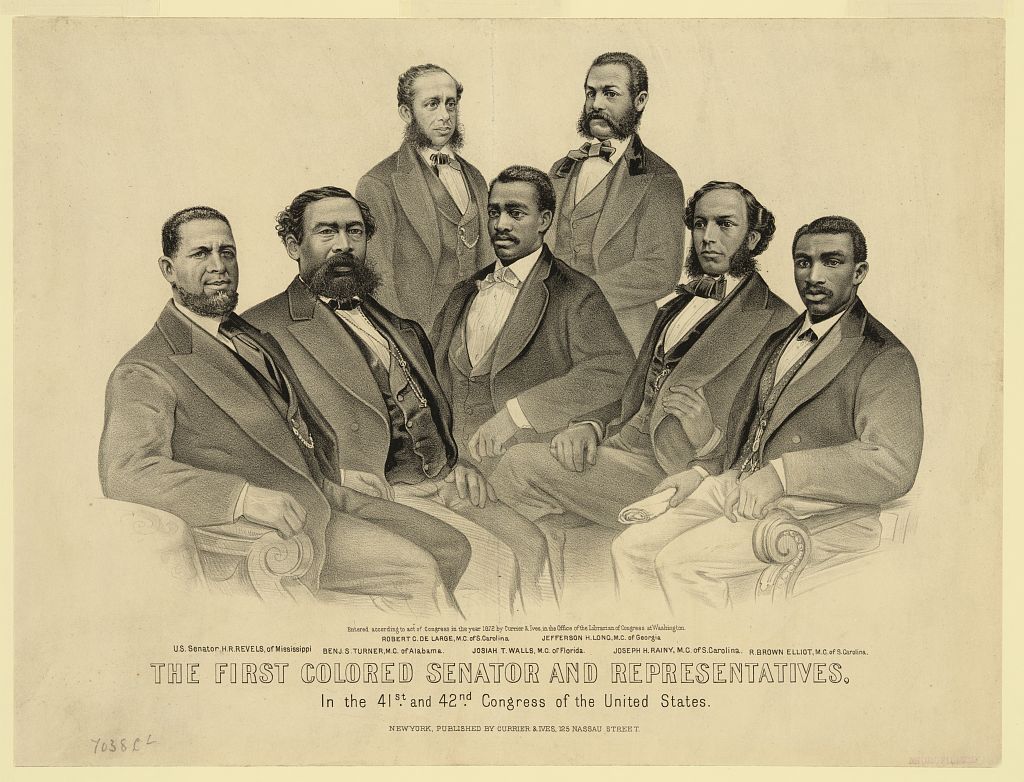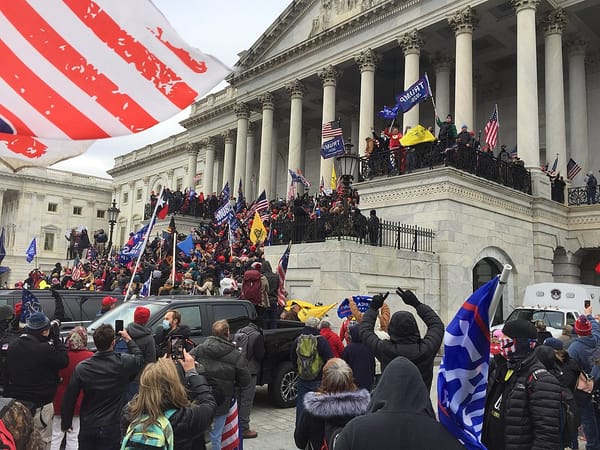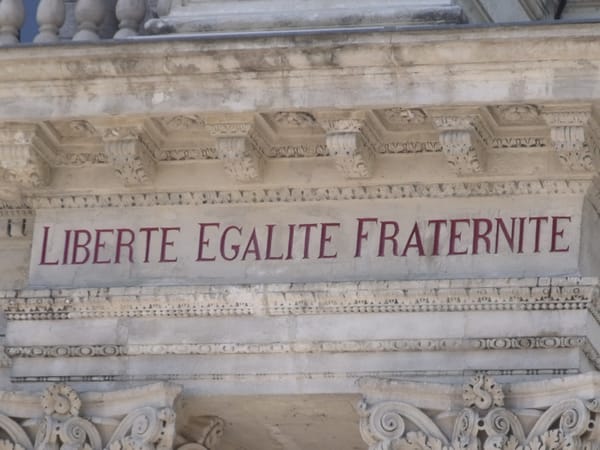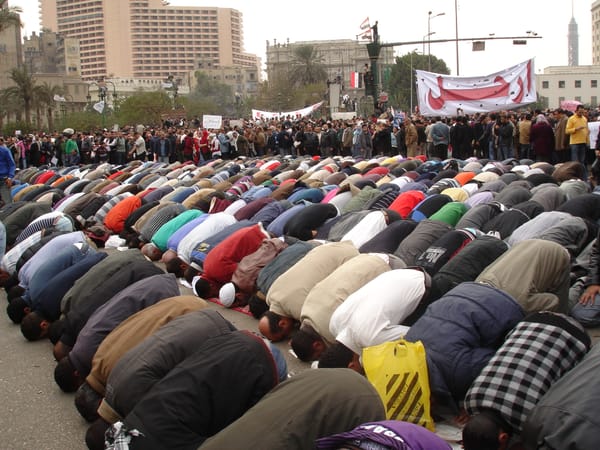Taking Inclusion Seriously: Kevin Elliott's Democracy for Busy People

“How is it that we hear the loudest yelps for liberty among the drivers of negroes?” This question, asked by English writer Samuel Johnson in 1775, still touches a nerve today. Americans on the one hand carry the pride of one of the oldest sets of representative institutions in the world. On the other, we carry the shame of centuries of chattel slavery, Jim Crow, Chinese exclusion, and the genocide of Native Americans, to offer but an incomplete list. How democratic could a country be that exhibited such obvious social hierarchies?
Jacob Levy answered the question as follows:
The early American republic, and especially the Jacksonian republic, was at once much more democratic than any European state of the same era and much more racist, and these were not unrelated. A hierarchical society with countless small social gradations can treat racial subordination as continuous with many other kinds of subordination. A levelled hierarchy among whites sharpens the distinction at the edges of that category; a social hill is replaced by a social plateau that ends in cliffs. The expanding rights and proud equal dignity of lower-class whites came to consist precisely in their equal claim to whiteness; this became a foundational fact of American democratic equality.
Levy’s remarks about the early American republic are clarifying precisely because it is far too common to assume that a single value, democratic equality, undergirds a democratic political system. What Levy’s analysis suggests instead is that this value is not singular, but has components, and those components have historically often been at odds with one another. Democratic institutions that offer a great deal of equality among political participants may be sharply exclusionary against broad segments of the population. Highly inclusive institutions may enable wide variation in degrees of participation and influence. These two dimensions need not always be entirely in tension—the early republic was in fact more politically inclusive than many of its contemporaries—but there are certainly specific ways in which increasing political equality necessarily trades off with political inclusion, and vice versa.
Though the variations in its implementation matter a great deal, in general universal suffrage in liberal democracies is the most inclusive institutional arrangement in history. Critics of this arrangement do not, in general, argue against the moral virtue of democracy—for democracy has overwhelmingly won the moral argument against its alternatives, even outside of actually democratic countries. Instead, one set of critics—democratic skeptics—argue that it is impractical. Another set of critics—democratic theorists—argue that elections and universal suffrage do not do enough to maximize true democratic equality.
Each of these critics runs into the trade-off between political equality and political inclusion. The skeptics do so more or less explicitly. The philosopher Jason Brennan, for example, revived the age-old argument for political equality among the smart and educated through the exclusion of the foolish and ignorant. The democratic theorists, by contrast, minimize inclusion by accident. They recommend a series of participatory institutions that are in practice too burdensome for ordinary citizens—and especially the most vulnerable and lowest-income citizens—to use effectively.
This dichotomy between political equality and political inclusion as components of the larger ideal of democratic equality was formulated by the political theorist Kevin Elliott in his new book, Democracy for Busy People. Elliott takes on the skeptics and the democratic theorists and argues for the primacy of inclusion for any democratic arrangement. He grounds his analysis in people like his mother, “a single working mother without a college degree” who was disengaged from politics for many years not “due to any infirmity or lack of ability” but fundamentally because “she was busy.”[1]
Not busy the way a high-powered lawyer or other successful professional is. She was not plowed under with work imposed by a demanding work ethic and culture. She was busy in more mundane ways—if she didn’t pick up the child, shop for groceries, cook the meal, do the dishes, pay the bills, clean the house, tend the child, track the household budget, etc.—it simply wouldn’t get done. And after doing all of this every day, day after day, without break or assistance, she also had to find time to rest and recuperate her energies to prevent depression and burnout, at which she was only ever partly successful. She was busy the way millions of people around the world are: swamped by meeting the everyday demands of life while maintaining a modicum of sanity.[2]
Elliott seeks to articulate a vision of democracy that can include people as busy as his mother was. His critique of democratic theorists is that demandingness is exclusionary, specifically for people like her. His critique of the skeptics is that people like his mother are capable of participation—indeed, eventually she herself became politically engaged. He poses the questions:
What institutional conditions generate the most conducive circumstances to encourage citizens like my mother was to become citizens like my mother is? How can we chart a course from apathy to attention using institutions? Moreover, how can we do so while making sure to leave no one behind?[3]
He articulates the normative goal of his program as “stand-by citizenship,” which provides a floor with “upward flexibility” on participation by all. He then goes on to discuss institutional conditions which might promote and maintain stand-by citizenship as broadly as possible.
Apathy
Skeptics of democracy often rest their arguments on the apathy of the masses. Some go so far as to defend that apathy as a positive good. Elliott argues that political apathy is neither inevitable, nor normatively defensible.
One of the book’s most interesting discussions in this area concerns political stability. There is a line of argument he traces to Bernard Berelson and Samuel Huntington which maintains that too much political engagement can be destabilizing. The former, along with his colleagues, argued that:
Apathy among some citizens, then, allows for compromises to be struck because apathetic citizens are not wedded to intransigence on policy in the way extremely interested partisans are. Representatives know they can make compromises because not all of their supporters are strongly interested in the specifics of the result.[4]
Huntington argued that “because democracy cannot meet all the demands made of it by the groups who became politically mobilized in the 1960s and 1970s,” that broad mobilization would ultimately prove anathema to democracy, as disappointment would lead to disenchantment and delegitimization.[5]
Elliott provides a strong counterargument, pointing out that authoritarians and Trump-style populists often draw precisely on those previously indifferent, apathetic, or apolitical: “Political apathy also threatens democracy by creating a class of citizens who are not politically socialized. Politically non-socialized citizens are a menace to democracy because they may come crashing into the system with unrealistic expectations and a vulnerability to demagoguery, which can empower anti-democratic actors and threaten democratic stability.”[6]
Rather than mobilization serving to destabilize democracy in the manner that Huntington envisioned, “exclusion is potentially more disruptive of stability since it is effectively impossible for groups to remain durably passive in politics. Events always transpire to mobilize them. Far from apathy serving as a reliable guarantor of stability, it could just as often serve as political dynamite packed around the foundations of democracy, waiting only for a spark.”[7]
It was one thing to exclude the great mass of peasants from politics in pre-modern agrarian societies. But modern citizens are literate, can communicate nearly instantly across any distance (and therefore coordinate across any distance as well), and have access to resources and technology that either did not exist or were far out of reach for the underclasses of old. As Elliott rightly points out, even where significant portions of modern citizens are disengaged for a period of time, it’s impossible to guarantee they will remain so. Indeed, this is precisely why democracy is a more practical arrangement than its alternatives, and why the most stable non-democracies get as close to liberal democratic arrangements as they can without putting their incumbents at too much risk of losing power.
Rather than exclusion or apathy, then, “A better response is therefore to mobilize everyone and get them effectively heard and included in the political system.”[8]
Elections are good, actually
To a non-academic, it is a bit stunning to read that “Elections are the neglected misfits of democratic theory today.” Yet the very people who are supposedly theorizing the basis of democracy do turn their noses up at the single most important institution distinguishing democracy from its alternatives. They argue that “elections have an ineradicable oligarchic or aristocratic bias”[9] and propose a smorgasbord of alternatives.
As a political theorist attempting to persuade other theorists, it makes sense that Elliott would spend time attempting to make democratic theorists live up to their moniker, but from the outside it feels difficult to take democratic theorists seriously. Now, among political scientists—who study systems that really exist—the conceptual distinction between democracy and non-democracy rests entirely on whether or not the top political authorities are held to free and fair elections which they stand a credible chance of losing.[10]
Ever focused on busy people, Elliott points out that voting in elections “is the quintessential example of participation that is simple, easy, and undemanding.” More than this, as a “large, society-wide event that stimulates media coverage and widespread public discussion,” they are a force for broader mobilization.[11] Crucially, “Elections remain the most inclusive participatory institution by a comically wide margin. More people vote than have even heard of a citizens’ assembly, let alone than have actually participated in any deliberative institution.”[12]
Elliott goes further than merely defending elections, articulating a “Paradox of Empowerment”: “increasing opportunities for greater participation may often perversely function to further empower existing elites and empowered groups rather than broadening access to power to marginalized groups.”[13]
Here, the value of grounding his analysis in busy people really comes to the fore. The citizen voice and participatory institutions implemented in the Progressive Era, and pushed by democratic theorists today, are in principle open to all, or all within the relevant jurisdiction. The practical impediments to making full use of those mechanisms, however, means that those who do make use of them are disproportionately drawn from groups that already come from the high end of social power and influence. Political equality among participants in these institutions may be increased, but at the cost of drastically less inclusivity.
Stand-by citizenship
Elliott follows his response to democracy’s critics with a normative model which he calls “stand-by citizenship.” This standard is more demanding than simply having universal suffrage laws or even having very few hurdles to voting in practice. It consists of “critical attention,” “the civic skills needed for participation,” and “upward flexibility.”[14]
Critical attention has two components, having “the habit of paying attention to politics.” and actively exercising “one’s judgment through critically reflecting on what one sees.”[15] Going from paying attention and judging to taking action, however, requires a specific set of civic skills, “the nuts-and-bolts questions of how and when to register, how and when to vote, who the candidates and parties are and what they stand for,” and similar details that “help supply reasonable expectations regarding how the political system works and what to expect from it,” and how to participate in it.[16]
Somewhat surprisingly, Elliott does not insist that stand-by citizens must exercise these skills regularly in order to meet his minimum normative standard. For a variety of reasons, a citizen who knows how to participate in politics and regularly observes and judges it may decide to sit out an election, or even several elections. On the flipside, however, they may see opportunities to participate beyond elections and judge that they ought to pursue them. Critical attention and civic skills thus provide a floor for participation, but upward flexibility entails an openness to deepening that participation beyond the minimum, without normative limit.
Maintaining critical attention and civic skills is no small task on its own, and it is not something we should treat as a matter of individual responsibility. Both are “a product of habit or unconscious absorption from those around us, as well as incidentally through actual participation.”[17]
Institutions and culture produce and maintain stand-by citizenship, which “makes us poised for participation, like an arrow drawn back on a bowstring, tensed for action. We may remain in that state of preparedness indefinitely, or launch ourselves into the political arena, as far and as intensely as we choose. In this conception, the sky’s the limit.”[18]
Upward flexibility allows stand-by citizenship to encompass both the political heroism of the mid century civil rights activists and the ordinary citizenship of those too busy to do more than vote in elections. What Elliott cannot abide is a citizen body that is not able to participate or even to form an opinion on whether they want to participate more fully. Critical attention combined with the civic skills required to participate leave stand-by citizens ready to respond to situations they themselves judge to be worth responding to, and within their capabilities to do so.
Politics as a social process
How, then, might we foster stand-by citizenship?
First and foremost, against the democratic theorists, it is important to “concentrate power in the institutions in which it is the cheapest and easiest to participate.”[19] In a word: elections. Moreover, elections are:
a large, society-wide event that stimulates media coverage and widespread public discussion. This event focuses and concentrates society’s attention, collectively, on politics, granting even the most pluralistic society a unifying focal point.[20]
Elections are both inclusive and by their nature produce what political scientists refer to as political interest, a crucial component of both critical attention and for motivating the maintenance of civic skills. Not all elections are created equal, however. Wide variance in turnout rates across democratic countries indicates that some arrangements or cultural environments are better at mobilizing citizens than others. Differences may arise from barriers to participation, such as the difficulty of registering to vote in some places in America or long wait times at polling centers on election day. Or they may arise from a failure to cultivate the habits of paying attention or participating (even to a minimum extent); irregular and poorly advertised elections for example might cause people’s civic skills to atrophy.
Elliott suggests we maximize the mobilizing potential of elections by holding them every year, and enacting mandatory voting. By the latter he specifically means “a strictly enforced legal requirement that every eligible voter attend a polling place or submit a mail-in ballot during an election, on pain of a small monetary fine unless an adequate excuse, including conscientious objection, is provided.” He sees these reforms as “tutelary” institutions “that can help induce the kind of cognitive political engagement characteristic of stand-by citizenship” as well as “improve democracy’s responsiveness.”[21]
He also suggests a number of practical measures to reduce the barriers to voting that currently exist in America specifically. Rather than putting the onus on citizens to register to vote, the government ought to do so automatically, given that it already has the information it needs to do so. Pairing this with same-day registration by anyone that was missed by automatic registration would do away with the entirely self-imposed burdens of voter registration in the several forms it exists in America today.
Contrary to the anti-party sentiments that are endemic in political theory and democratic theory in particular, Elliott emphasizes how crucial political parties are for democratic participation in general, and the encouraging of stand-by citizenship in particular. In a healthy liberal democracy, parties serve to mitigate against political disengagement. “Parties’ democratic superpower is that their greed for power drives them to reach these citizens where they are and turn them into active supporters, along the way bringing them up out of apathy and transforming them into stand-by citizens. No other democratic institution can make this same claim, with the possible exception of mandatory voting.”[22]
For the various efforts to reach and organize such citizens, which Elliott documents[23], provide them with “a scaffolding or foundation to support their developing political identity.”
Party identification can help citizens to situate themselves in politics, learning whom to ally themselves with and whom to oppose. It helps them align their affinities and antipathies; it helps socialize them into politics, in other words. This new social identity then serves as the motivational core of their activities as citizens.[24]
Of course, parties will only behave this way in an actually competitive party system. Here in America, we have, to some extent, a competitive two-party system at the federal level. But our system as a whole would better be classified as a two-at-most party system, with many quite powerful state and local governments totally dominated by only one party each. The direct primary, both a method for mitigating the downsides of this arrangement and one of its primary causes, does away with those facets of parties and partisanship that Elliott rightly notes help to politically integrate busy citizens.
Elliott favors multipartyism rather than two-partyism, as the former “allows for greater dimensionality in political competition,”[25] more party brands that can target the formation of a greater array of distinct political identities. The path to multipartyism is well known: legislatures that are apportioned through multi-seat proportional representation methods, rather than the single-seat plurality-winner method currently used for nearly every elected office in America today. To this I would add the abolition of the direct primary as it currently exists, as this has served to institutionalize two-at-most partyism by providing an open venue for capturing a party label by political talents who, in other systems, would have opted to form their own parties.[26]
This would also be furthered by another of Elliott’s proposals, to deal with the “long ballot” of numerous local and state offices that are up for election. It may be that “Centralizing power into fewer high profile electoral contests actually boosts inclusion by making it easier and more cognitively tractable for ordinary citizens,”[27] but increasing the centrality of legislatures specifically also facilitates the creation of a competitive multiparty system.
Elliott meets the theoretical challenges to democracy head-on and provides a workable normative model to judge real-world examples by. He goes on to provide an institutional analysis and reform package in detail that is unusual for what is chiefly a work of political theory rather than political science or political activism. The theorist, the empiricist, and the activist alike will all find something of value to take away from Democracy for Busy People.
[1] Kevin J. Elliott, Democracy for Busy People (pp. 3–4). University of Chicago Press. Kindle Edition.
[2] Ibid., 4.
[3] Ibid., 14.
[4] Ibid., 31.
[5] Ibid., 32.
[6] Ibid., 46.
[7] Ibid., 50.
[8] Ibid., 50.
[9] Ibid., 120.
[10] “In particular, the countries we today call ‘democratic’ display a specific pattern of political competition for control of states. Roughly speaking, in democracies multiple organized groups compete for the support of large publics (in theory, all adults) in electoral contests in order to gain control of key offices of the state (for example, the presidency, a majority of seats in the legislature). One important feature of this form of political competition is that formal ‘barriers to entry’ into the competition for power are relatively low: incumbents (the current group or groups controlling the state) have limited abilities to prevent groups with different views about the proper uses of state power from forming, organizing, appealing to the electorate, or assuming office if they win an election, much less physically harming the membership of these groups. In the pithy formulation of political scientist Adam Przeworski, democracies are political systems in which ‘parties lose elections’, precisely because they cannot systematically prevent their opponents from winning them.” Xavier Márquez, Non-Democratic Politics (pp. 1–2). Palgrave Macmillan.
[11] Kevin J. Elliott, Democracy for Busy People (pp. 122–123). University of Chicago Press. Kindle Edition.
[12] Ibid., 79.
[13] Ibid., 72.
[14] Ibid., 104.
[15] Ibid., 101–102.
[16] Ibid., 102–103.
[17] Ibid., 103.
[18] Ibid., 104.
[19] Ibid., 119.
[20] Ibid, 123.
[21] Ibid, 134-135.
[22] Ibid, 162.
[23] “So how do parties help to make new, stand-by citizens? First and most directly, they do so through organizing groups politically, particularly new and politically disconnected individuals. This is perhaps the most direct means by which parties mobilize, other than actual get-out-the-vote (GOTV) efforts. Political organizing is the process of articulating connections between the party and groups or individuals. This process often occurs through mediating institutions, such as unions or churches. Some of the most effective types of organizing seem to involve long-term engagement in the community, including providing ordinary forms of social (nonpolitical) support and service. Another common vector of organizing is canvassing, where supporters knock on doors or otherwise engage people in public spaces to urge their support. Such canvassing is often part of conventional GOTV efforts, yet these effrots shade into organizing when targeted at habitually disengaged citizens because of how they serve to transform these citizens’ view of themselves and their relationship to politics. Lisa García Bedolla and Melissa Michelson explain how this process works using what they call a Sociocultural Cognition model of mobilization that works by tapping into ideas that the individual already has to encourage them to adopt “a new cognitive schema as ‘voter'”—or active democratic citizen. Focused canvassing efforts induce these individuals to develop new understandings of themselves and of their relationship to the wider political community, one in which they take an active role.” Ibid, 163-164.
[24] Ibid, 164.
[25] Ibid, 170.
[26] See the discussion in Taylor, S. L., Shugart, M. S., Lijphart, A., & Grofman, B. (2015). A Different Democracy: American Government in a 31-country perspective (pp. 181-184). Yale University Press.
[27] Kevin J. Elliott, Democracy for Busy People (pp. 133). University of Chicago Press. Kindle Edition.
Featured image is The first colored senator and representatives – in the 41st and 42nd Congress of the United States




